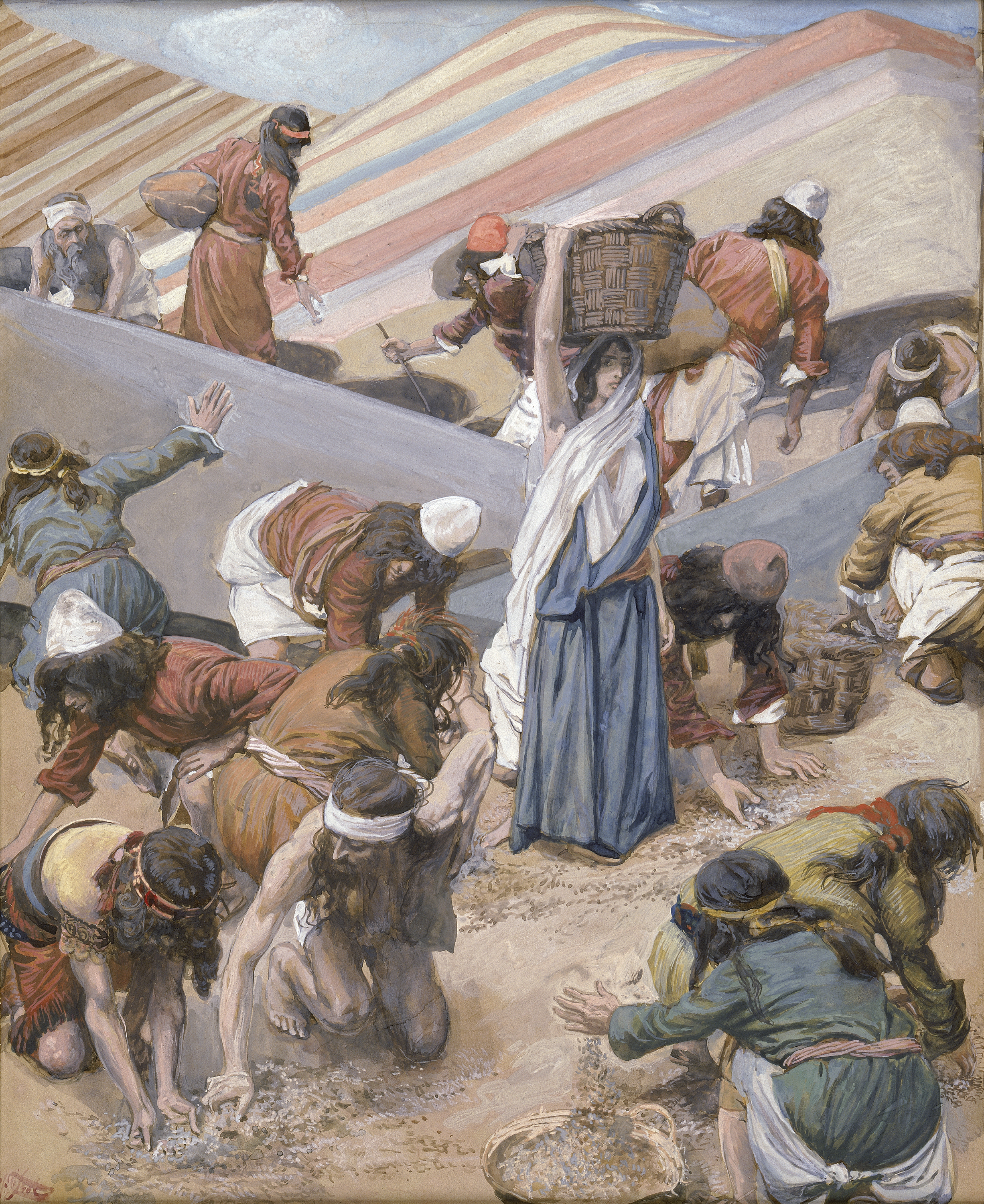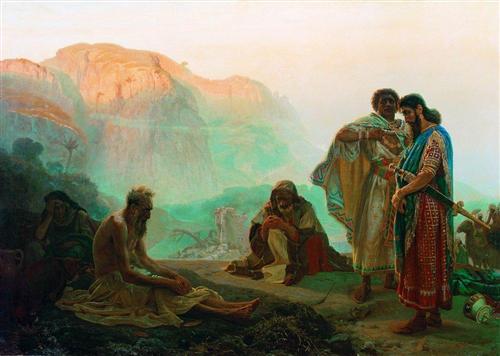“Moses … during the Battle of Rephidim, assisted by Hur and Aaron…”
The readings for Sunday September 28 are Exodus 17:1-7, Psalm 78:1-4, 12-16, Philippians 2:1-13, and Matthew 21:23-32. For Psalm 78, see On the psalms up to September 28. The full readings are at Sixteenth Sunday after Pentecost Proper 21, but here are some highlights.
Exodus 17:1-7 tells about the Children of Israel, complaining in the “wilderness of Sin,” which is a lot like last week’s OT, on the “Children of Israel moaning and complaining in the Wilderness, despite God’s miraculously rescuing them from their slavery in Egypt.”
In this reading they “camped at Rephidim, but there was no water for the people to drink.” Moses told God, “What shall I do with this people? They are almost ready to stone me.”
(BTW: That’s why – in telling the Story of Creation – Moses had to use “language and concepts that his relatively-pea-brained contemporary audience could understand.” See On the readings for June 15 – Part I. That is, if Moses had said something like “the earth revolves around the sun,” he would have been stoned to death, or at least tarred and feathered.)
So anyway, here’s what Wikipedia said about the encampment at Rephidim and what happened after Moses provided water by “striking a rock,” the subject of today’s reading:
[T]he Amalekites attacked the Israelites while encamped at Rephidim, but were defeated (Exodus 17:8-16)… The Israelites were led by Joshua in the battle. Moses, Aaron and Hur watched the battle from a hill. Moses noticed that when his arms were raised the Israelites gained the upper hand, but when they were down the Amalekites struck back. Moses sat with his hands held up by Aaron and Hur until sunset, securing the Israelite victory.
(Empasis added.) And by the way, the emphasized portions sound a lot like a modern-day football fan, watching his favorite team on TV; moving around the room, sometimes standing, sometimes sitting, but always trying to “help his team win.” (See Rephidim – Wikipedia, the free encyclopedia, and also On “God’s Favorite Team” – Part I.)
Which makes this Bible reading very timely for the 2014 pro and college football season.
Anyway, in Philippians 2:1-13 Paul wrote what the International Bible Commentary (IBC) calls the famous “early Christian hymn on the humility and exaltation of Christ.” The Complete Jewish Bible translates Philippians 5 as, “Let your attitude toward one another be governed by your being in union with the Messiah,” then goes to Philippians 6-11:
Though he was in the form of God, he did not regard equality with God
something to be possessed by force. On the contrary, he emptied himself,
in that he took the form of a slave by becoming like human beings are…Therefore God raised him to the highest place and gave him the name above every name; that in honor of the name given Yeshua [Jesus], every knee will bow — in heaven, on earth and under the earth — and every tongue will acknowledge that Yeshua [Jesus] the Messiah is Adonai [Lord] — to the glory of God the Father.
(And a BTW: In Philippians 2:11, Paul quoted Isaiah 45:23: “In the name of myself I have sworn, from my mouth has rightly gone out, a word that will not return — that to me every knee will bow and every tongue will swear.” And in Philippians 2:12, Paul quoted Psalm 2:11, “Serve the Lord with fear and trembling.”)
And finally, in Matthew 21:23-32, Jesus again distinguished the religious “powers that be” who challenged his authority,* with the simple “sinners” who did believe in Him and welcomed His message of redemption, telling those distinguished persons:
“Truly I tell you, the tax collectors and the prostitutes are going into the kingdom of God ahead of you. For John came to you in the way of righteousness and you did not believe him, but the tax collectors and the prostitutes believed him; and even after you saw it, you did not change your minds and believe him.”

The upper image is courtesy of Rephidim – Wikipedia, the free encyclopedia, with the full caption: “Moses holding up his arms during the Battle of Rephidim, assisted by Hur and Aaron, in John Everett Millais‘ Victory O Lord! (1871).”
The lower image is courtesy of Matthew in the Bible – Tax Collector and Apostle – Christianity, with the full caption: “Jesus calling Matthew, a taxman, to follow him and become a disciple.” The web article noted that “Matthew was a dishonest tax collector driven by greed, until Jesus Christ chose him as a disciple… Tax collectors were notoriously corrupt because they extorted far and above what was owed, to ensure their personal profit. Because their decisions were enforced by Roman soldiers, no one dared object.” The article further noted this unique take on Matthew:
Despite his sinful past, Matthew was uniquely qualified to be a disciple. He was an accurate record keeper and keen observer of people. He captured the smallest details. Those traits served him well when he wrote the Gospel of Matthew some 20 years later.
(Sometime the Lord does indeed “work in mysterious ways.”)
As to the location of Rephidim, see wilderness of Sin, which noted that it was “a geographic area mentioned by the Bible as lying between Elim and Mount Sinai. Sin does not refer to sinfulness [at least not literally], but is an untranslated word that would translate as the moon,” and/or as referring or alluding to the “semitic moon-deity Sin.”
* As to Jesus’ thoughts on “the religious ‘powers that be,'” see also Atlanta Bishop Robert Wright’s recent take on the readings for Sunday, September 28:
Institutional authorities often become obsessed with order and institutional maintenance to the detriment of innovation and adaptation. It becomes precedent over people; ritual over reflection; structure over Spirit… God’s spirit does come through the church but refuses to be limited by the church or the clergy.
(“The Scribe” couldn’t have said it better himself.) See The Episcopal Diocese of Atlanta, Georgia (GA), under “For Faith,” for September 26, 2014.





 An image of “the eleventh hour,” referring to a point in time “nearly too
An image of “the eleventh hour,” referring to a point in time “nearly too 






